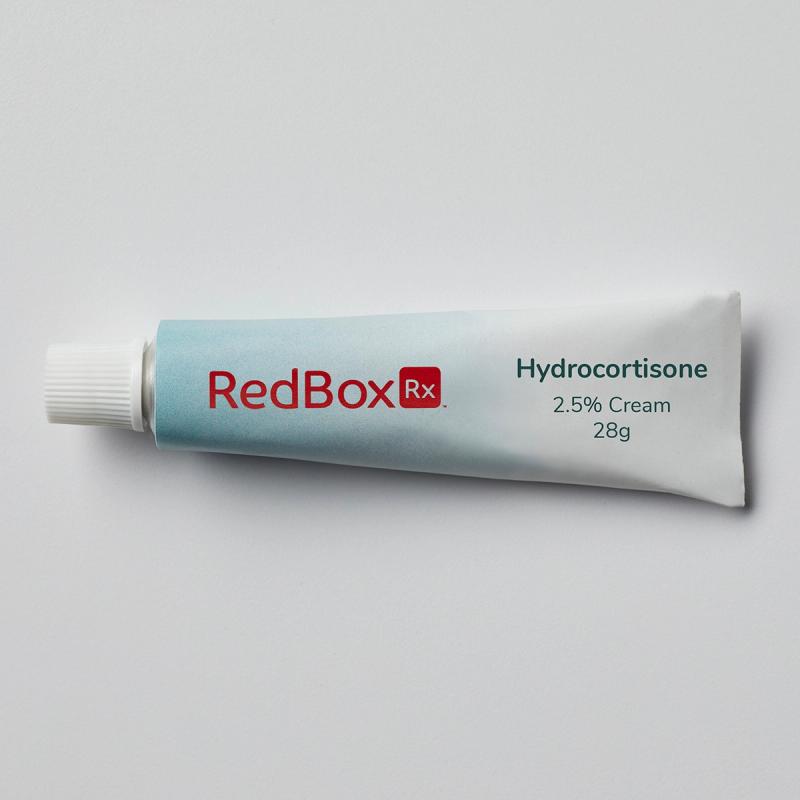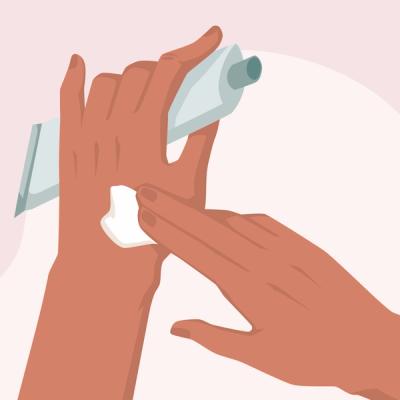Frequently asked questions about Hydrocortisone Cream 2.5%
-
Hydrocortisone topical is used to treat redness, swelling, itching, and discomfort of various skin conditions. Hydrocortisone is in a class of medications called corticosteroids. It works by activating natural substances in the skin to reduce swelling, redness, and itching.
-
Hydrocortisone comes as ointment, cream, solution (liquid), spray, or lotion for use on the skin. Hydrocortisone topical is usually used one to four times a day for skin problems. Apply it at around the same time(s) every day. Follow the directions on your prescription or product label carefully, and ask your doctor or pharmacist to explain any part you do not understand. Use hydrocortisone exactly as directed. Do not apply more or less of it or apply it more often than prescribed by your doctor. Do not apply it to other areas of your body or use it to treat other skin conditions unless directed to do so by your doctor.
If your doctor has prescribed hydrocortisone for your condition, call your doctor if your symptoms do not improve in the first 2 weeks of your treatment. If you obtained hydrocortisone without a prescription (over the counter) and your condition does not improve within 7 days, stop using it and call your doctor.
To use hydrocortisone topical, apply a small amount of ointment, cream, solution, spray, or lotion to cover the affected area of skin with a thin even film and rub it in gently.
This medication is only for use on the skin. Do not let hydrocortisone topical get into your eyes or mouth and do not swallow it.
Do not wrap or bandage the treated area unless your doctor tells you that you should. If you have psoriasis, your doctor may recommend an occlusive dressing.
If you are applying hydrocortisone topical to a child's diaper area, do not cover the area with tight fitting diapers or plastic pants.
-
This medication may be prescribed for other uses; ask your doctor or pharmacist for more information.
-
Before using hydrocortisone topical,
tell your doctor and pharmacist if you are allergic to hydrocortisone, any other medications, or any of the ingredients in hydrocortisone topical products. Ask your pharmacist for a list of the ingredients.
tell your doctor if you have or have ever had diabetes or Cushing's syndrome (an abnormal condition that is caused by excess hormones (corticosteroids)).
tell your doctor if you are pregnant, plan to become pregnant, or are breastfeeding. If you become pregnant while using hydrocortisone topical, call your doctor.
-
Unless your doctor tells you otherwise, continue your normal diet.
-
Apply the missed dose as soon as you remember it. However, if it is almost time for the next dose, skip the missed dose and continue your regular dosing schedule. Do not apply a double amount to make up for a missed dose.
-
Hydrocortisone topical may cause side effects. Tell your doctor if any of these symptoms are severe or do not go away:
burning, itching, irritation, redness, or dryness of the skin
acne
unwanted hair growth
skin color changes
tiny red bumps or rash around the mouth
small white or red bumps on the skin
Some side effects can be serious. If you experience any of these symptoms, call your doctor immediately:
severe rash
redness, swelling, or other signs of skin infection in the place where you applied hydrocortisone
Hydrocortisone topical may cause other side effects. Call your doctor if you have any unusual problems while using this medication.
If you experience a serious side effect, you or your doctor may send a report to the Food and Drug Administration's (FDA) MedWatch Adverse Event Reporting program online (http://www.fda.gov/Safety/MedWatch) or by phone (1-800-332-1088).
-
Keep this medication in the container it came in, tightly closed, and out of reach of children. Store it at room temperature and away from excess heat and moisture (not in the bathroom). Do not freeze it.
Unneeded medications should be disposed of in special ways to ensure that pets, children, and other people cannot consume them. However, you should not flush this medication down the toilet. Instead, the best way to dispose of your medication is through a medicine take-back program. Talk to your pharmacist or contact your local garbage/recycling department to learn about take-back programs in your community. See the FDA's Safe Disposal of Medicines website (http://goo.gl/c4Rm4p) for more information if you do not have access to a take-back program.
It is important to keep all medication out of sight and reach of children as many containers (such as weekly pill minders and those for eye drops, creams, patches, and inhalers) are not child-resistant and young children can open them easily. To protect young children from poisoning, always lock safety caps and immediately place the medication in a safe location - one that is up and away and out of their sight and reach. http://www.upandaway.org
-
If someone swallows hydrocortisone, call your local poison control center at 1-800-222-1222. If the victim has collapsed or is not breathing, call local emergency services at 911.
-
Keep all appointments with your doctor.
Ask your pharmacist any questions you have about hydrocortisone topical.
It is important for you to keep a written list of all of the prescription and nonprescription (over-the-counter) medicines you are taking, as well as any products such as vitamins, minerals, or other dietary supplements. You should bring this list with you each time you visit a doctor or if you are admitted to a hospital. It is also important information to carry with you in case of emergencies.
-
We offer a variety of prescription medication options for skin rashes, hives, & eczema including:

How we help you
It is time to start thinking outside the healthcare box. Our medical and pharmacy teams provide the individualized care you need when you need it. All completely online. It is quality, trusted treatment with affordable convenience including:
- FDA approved prescription treatments
- Easy online visits on your own time
- U.S. licensed medical providers
- FREE delivery in discreet packaging
Sorry, we’re closed for today. Our U.S. licensed medical providers are available daily 7 a.m. to 9 p.m. CST via live video visit. We look forward to serving you soon. Email us anytime at [email protected].





